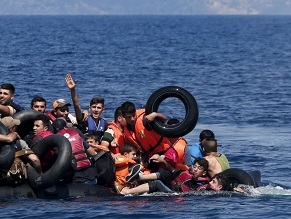|
World Jewish News

Syrian and Afghan refugees struggle to stay afloat after their dinghy collapses just off the coast of Greece. (photo credit:REUTERS)
|
Despite broad support of migrants among Jews, divisions remain
25.11.2015, Jews and Society While Jewish organizations, both in Europe and the United States, overwhelmingly favor accepting migrants, the Jewish community is far from monolithic, with some communities expressing fear over the possible consequences and anger over the terminology used in the debate.
This week the leader of Germany’s organized Jewish community called on Berlin to impose limitations on the number of migrants being granted asylum in the country, telling Die Welt that quotas are necessary in light of the fact that many of the refugees expected to arrive in Germany this year “come from places where hatred of Jews and intolerance are an integral part of the culture.”
“Many refugees are fleeing the terror of Islamic State and want to live in peace and freedom, but at the same time they come from cultures in which hate towards Jews and intolerance are fixed components,” Josef Schuster was quoted as saying. “Don’t only think about the Jews, think about equal rights for women and the treatment of homosexuals,” he added.
Roughly a million refugees and migrants fleeing war and deprivation in the Middle East, Africa and Asia are expected to arrive in Germany this year alone – the majority of those reaching Europe – and local authorities are struggling to cope.
Last month representatives of the Central Council of Jews in Germany informed Chancellor Angela Merkel of their concern that migration could potentially lead to a rise in anti-Semitism. They asserted that while “Germany must provide protection” to those fleeing from war, Berlin must make sure that only legitimate refugees are provided sanctuary.
“Many refugees come from countries where Israel is an enemy; their resentment is often transferred to Jews in general,” they warned, echoing a previous call by Schuster to Merkel that refugees should be brought to an “acceptance that support for Israel is part of the political DNA of this country.”
The fact that one of the perpetrators of the recent attacks in Paris entered Europe as a migrant has sparked fears of further violence by Jewish communities that have been targeted in recent years.
On Monday, Belgian Chief Rabbi Avraham Gigi told an Israeli radio station that he believed that there is no future for Jews in Europe. “There is a sense of fear in the streets. The Belgians understand that they too are targets of terrorism. Jews now pray in their homes [as opposed to in synagogues] and some of them are planning on emigrating,” the rabbi said.
On the other side of the Atlantic, multiple Jewish groups, including the Orthodox Union and the Reform movement’s Religious Action Center have called for the US to accept Syrian refugees.
Like other Jewish groups, the OU invoked the plight of Jewish refugees from Nazi Europe. “Just a few decades ago, refugees from the terror and violence of Hitler’s Europe sought refuge in the United States and were turned away due to suspicions about their nationality,” it said. “In fact, the Jewish immigrants that ultimately came to these shores fully adopted American values and have contributed greatly to the fabric of our great nation of immigrants.”
“The failure of most of the world, including the United States, to give a haven to Jews fleeing first from Nazi Germany and then from German-occupied Europe gave Hitler the assurance that no one would stop him from taking his anti-Semitic hatred to the next, foreseeable level. How many Jews murdered in the gas chambers of Auschwitz- Birkenau, Treblinka, and the other death camps might have lived if only the gates of the United States, Canada and Australia had not been closed to them,” asked Menachem Rosensaft, the founding chairman of the International Network of Children of Jewish Holocaust Survivors, in a recent Huffington Post op-ed.
Some Jews have expressed resentment over what they see as the misuse of Holocaust analogies when referring to the current situation, however.
“It is important to unequivocally note that regardless of the position one takes about admitting the migrants into the United States, there is absolutely no moral equivalency between the plight of the Syrian refugees and the unique trials and tribulations that confronted the Jews as they desperately sought to survive the Holocaust and the Nazi regime during World War II,” the National Council of Young Israel said in a statement on Tuesday.
“We believe that the historic Shoah and the current discord in Middle Eastern Islamist countries are two very different sets of circumstances. Drawing a parallel between the two is wrong and highly offensive to those Jews who survived Nazi persecution.”
By SAM SOKOL. Jerusalem Post staff and Reuters contributed to this report.
JPost.com
|
|
